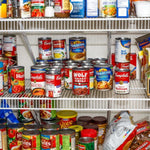Jared Smith
Prepping Doesn't Mean You're CRAZY
Prepping gets a bad reputation, and people who practice it are often labeled as crazy, apocalypse fear mongers.
It is a bit strange to see how people who only want to protect their families are singled out as fools or insane. So, today we're taking a closer look at preppers, the benefits of prepping, and what makes someone want to survive a disaster seem crazy.
What is a Prepper?
A “prepper” is a survivalist, which according to the Merriam-Webster definition is “one who has prepared to survive in the anarchy of an anticipated breakdown of society.”
It doesn’t sound that crazy, does it?
If history has taught us anything is that our society is prone to frequent revolutions and regime changes that lead to chaotic consequences and troubled times of uncertainty. It also showed us that we can control certain aspects of our environments, but that we cannot stop natural disasters from happening. Hurricanes, earthquakes, and pandemics can always stop life as we know it in its tracks and decimate us.
In most of these situations, safety is no longer guaranteed. Resources become scarce and shelter almost impossible to find. Preppers don’t have a sick desire for these things to happen. They just prefer having a contingency plan in case they do.
Why Prepping is a Good Idea
We don’t know what the future has in store for us. Everything that we do is a way of ensuring that we will survive the worst possible scenario.
If you think about it, we are "prepping" every day to improve our living conditions. We work to have enough money for food, shelter, and utilities. We dress up and groom ourselves to enhance our appearance and attract a mate, which in the end, represents our bid for reproduction. The list goes on and on.
So, storing food, water, and first aid supplies is a natural ramification of our ongoing fight for survival. Preparing ahead for an emergency is a rational strategy of improving our chances to overcome a disaster. It is a good way to avoid becoming a victim when history repeats, and when being safe is categorically better than being sorry.
Prepping is More Than Crazy Hoarding of Resources
Some people look at survivalists and see a never-ending list of storage foods, tools, and items that they store in their shelters/safe rooms. They see preppers as incurable hoarders who spend their last dime on adding more stuff to their end-of-days storage.
The truth is that prepping is quite the opposite of hoarding. Experienced preppers only store a relevant amount of goods that should help them survive during a specific period like 72 hours, 2 weeks, or 3 months and so on. Few are those who plan to spend their entire lives in a nuclear shelter.
Survivalists take good care of the goods that they store. They check their validity consistently, update them when they expire, and upgrade some of the items according to technological advances.
Additionally, preppers are aware that if they have to bug out and withstand a natural disaster, comfort is also important. They do not want to cram up their entire family in a basement full of bean cans and ready-to-eat meals. So, they look for the most efficient survival solutions that occupy the least possible space.
Prepping Benefits Good for All Times
Having a good emergency preparedness plan is essential for your survival when a disaster hits. At that point, you will pat yourself on the back for investing in a fallout shelter full of food, water, and clothing.
But, what if a disaster never comes?
Non-preppers generally use this question as an argument to contradict the importance of prepping. And, they are not entirely wrong. Being a survivalist requires an important initial investment followed by regular upkeep costs. All of them may become as precious as throwing money out of the window if it wasn't for these undeniable benefits of prepping:
Food storage always pays off
- If you are fired, and you can’t find a job for a few months, that extra food will keep you well-fed
- If you are robbed, and you are short on money, you can count on the storage food until you recover financially
- If you become ill and unable to work, you can rely on the storage food until your condition improves
- If a friend or someone in your family or in your community loses everything, you can help them recover by sharing some of your storage food
- If a pandemic like the ongoing COVID-19 hits and food shortages ensue, you can remain safely at home and enjoy your stored goods without fighting other people for it at the supermarket
Self-sufficiency teaches you new skills
- Being a prepper implies knowing how to hunt, fish, cook, sew, dress a wound and purify water
- As a survivalist, you learn how to do gardening and grow your own food
- Prepping teaches you to build a shelter, repair faulty electric wiring and build a fire from scratch
- Emergency preparedness enhances your organizational abilities, improves your focus and helps you get the best out of the resources that are available around you
Last, but not least, almost everything that you store can be revalued at a later time, as long as it doesn’t have an expiry date. You can later sell and trade any of the supplies in the first-aid kit, the communication devices and practical items like rope, matches and cooking utensils.
People Who Give Prepping a Bad Reputation
So, there you have it! Prepping doesn’t mean you’re crazy. It means that you take an extra, rational step in securing a better future for your family whether a disaster strikes or not. Through this process, you gain new skills and improve your current abilities. You invest in reusable goods and foods with a long shelf life that you can even share with others.
With that being said, we cannot ignore the people who give prepping a bad reputation. We are talking about the ones who think that the apocalypse is just around the corner. They see conspiracy theories in every piece of news that they come across. They confuse storing with hoarding and simple survival skills with advanced military combat techniques.
We cannot legally refer to them as “crazy,” but we understand why some mistake their over-the-top behavior with something as simple and reasonable as prepping.
Share on:









